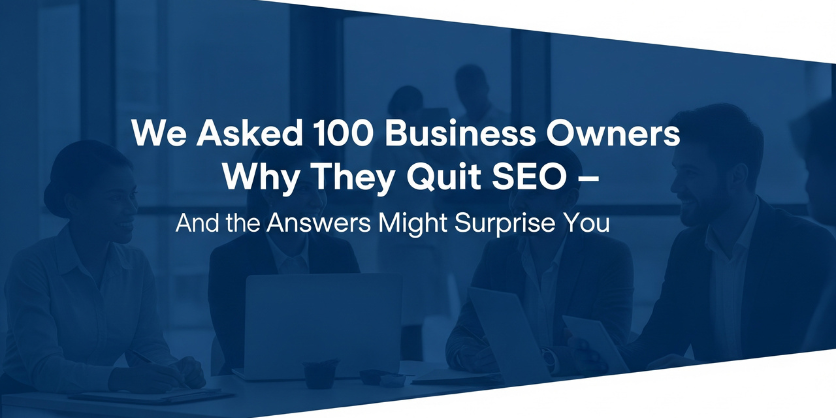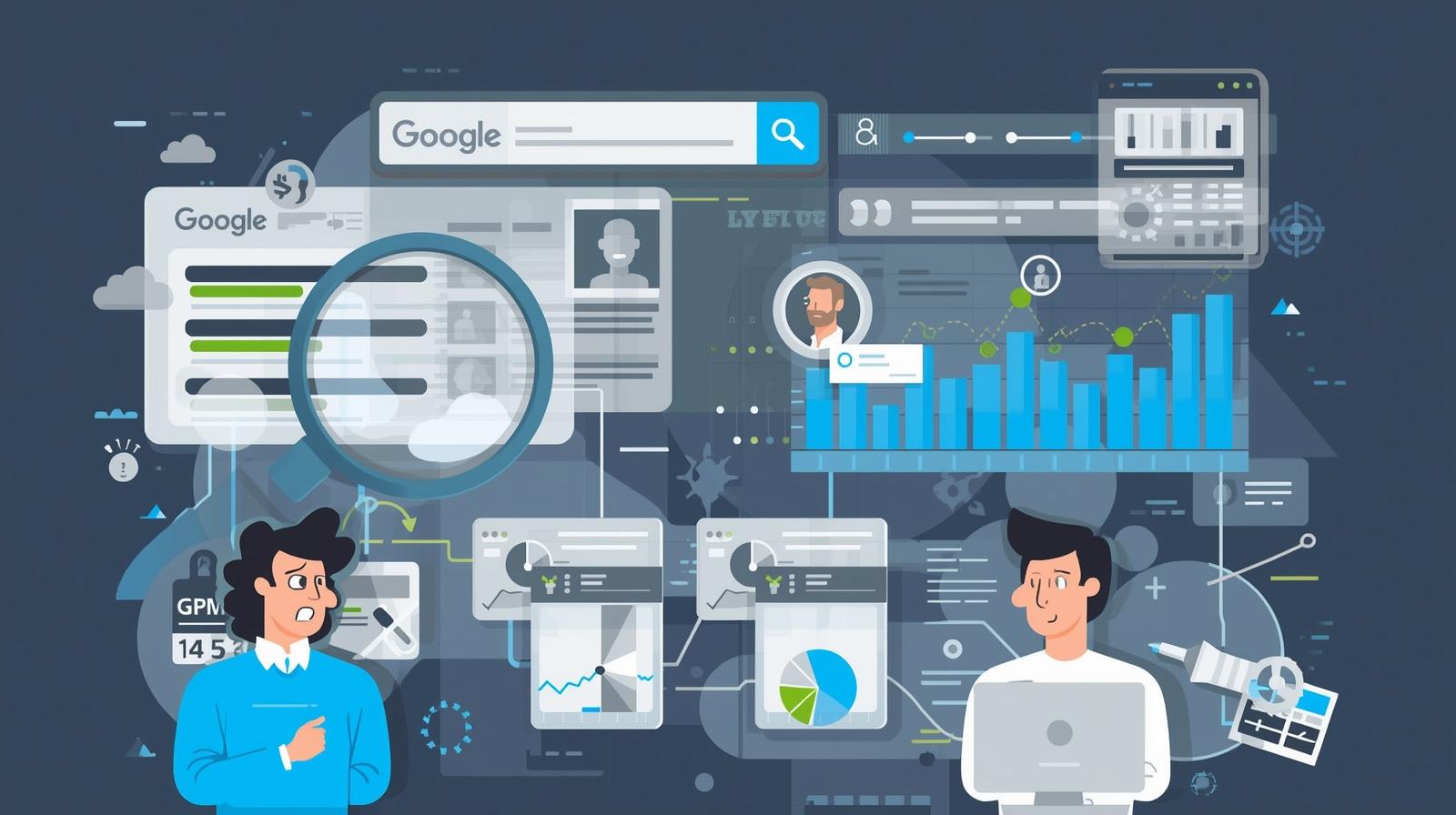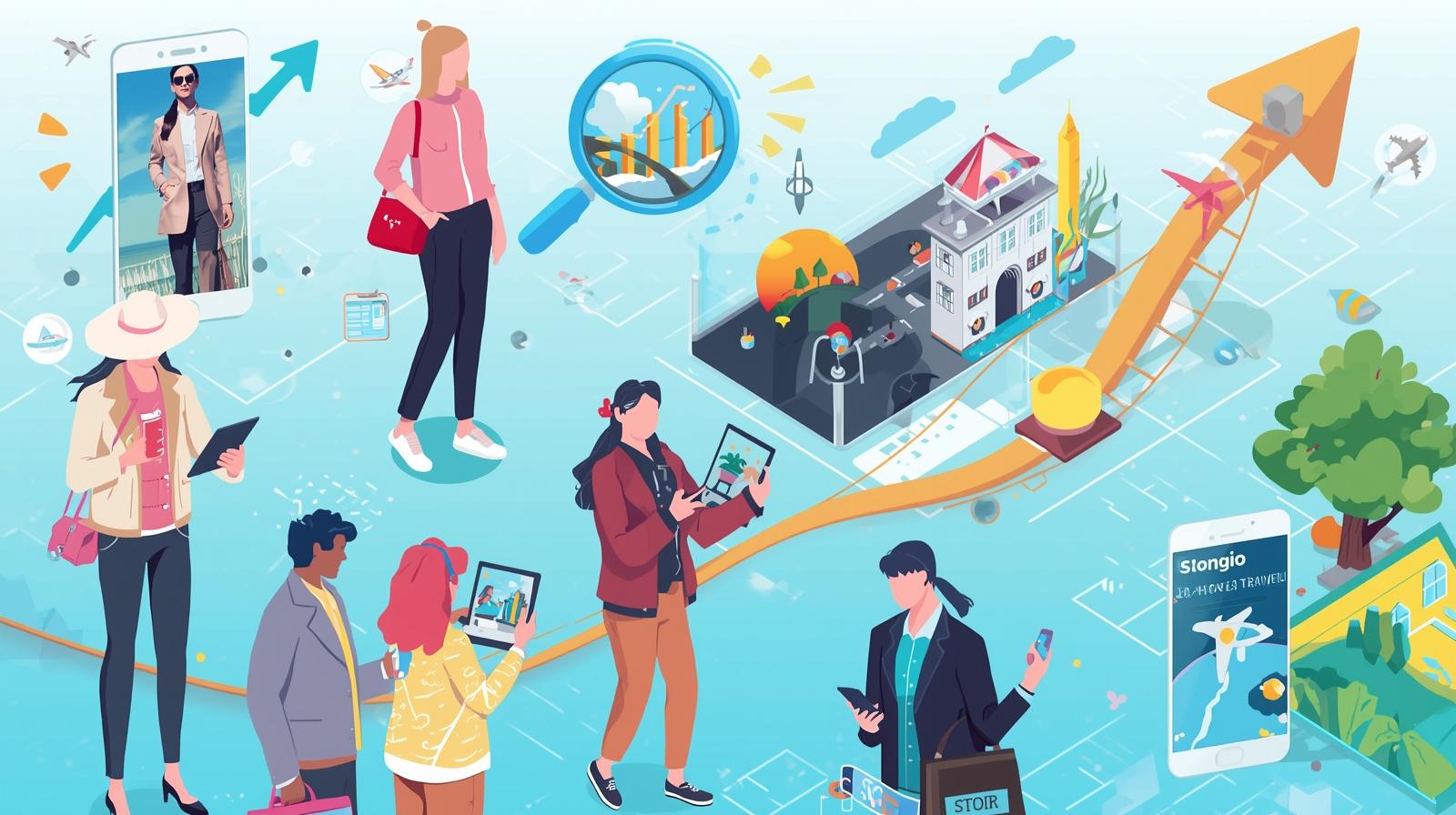For years, SEO, which stands for Search Engine Optimisation, was seen as the secret sauce behind getting consistent, free traffic from Google. It was the go-to strategy for long-term growth, and for a while, it worked wonders.
But the landscape has shifted. With AI now deeply woven into how search engines work and how people search, many businesses are finding that traditional SEO just doesn’t deliver like it used to.
So we asked 100 business owners and marketing leaders a straightforward question:
“Why did you stop investing in SEO?”
Their responses? Surprisingly honest. In some cases, even a little painful to hear. But there was a pattern, clear frustrations, similar roadblocks, and a growing sense that SEO had become more guesswork than growth.
In this article, we’re breaking down what they told us, and more importantly, how we can convert that frustration into real, measurable results.
Top Reasons Why Businesses Quit SEO — and What They Need to Understand
A few skipped, but most of them responded, and after going through all the responses, we came across something old and something new and sharing the same here.
1. It feels slow
We all know SEO is not a bullet train; it is still a diesel engine that works, but on its own pace. It requires constant effort, time, patience, and a bit of trust. And that is why it frustrates so many people. The most common complaint from business owners it is not the best method to get results faster.
And they are not wrong, SEO is not paid ad, which can generate clicks and traffic within hours. It takes time and continuous learning, and effort. But these business owners also understand that paid ads and SEO are different, and building something great, which is the primary aim of SEO, requires time.
2. It sometimes doesn’t work
SEO isn’t a box you tick once. Writing a blog post with a few keywords won’t skyrocket your traffic. Real SEO involves continuous effort, from technical tweaks to content strategy to backlink building.
When businesses say “we tried SEO,” it often means they dabbled, didn’t see magic, and gave up. But like any form of exercise, results come from consistency, not from a one-time workout.
Additionally, continuous changes in algorithms have made predicting working methods and results impossible for even reputed SEO service providers.
3. We Already Run Ads
Businesses are getting results with paid ads, and they don’t see the value in investing in SEO now. Ofcource paid ads are great, fast, targeted, and effective. But once you stop paying, your visibility disappears.
SEO, on the other hand, keeps working even when the ad spend runs out. It’s the difference between renting and owning. The smartest strategy? Don’t choose one over the other. Use ads for short-term wins and SEO for long-term growth. Together, they’re more efficient.
4. We Don’t Have the Budget
Often, the issue is not budget, but priorities. Businesses will spend big on redesign or branding but hesitate to invest in visibility. An attractive website means nothing if no one sees it.
However, you don’t have to put a lot of money. It can be scaled up depending on what you can afford. But skipping it altogether? That’s where it’s most expensive. Because your customers are out there, just looking for your competitors.
5. Technical Difficulties
SEO is technical, and terms like “structured data” and “core web vitals” can make anyone’s head spin. But when there are many service providers out there so you don’t have to do it yourself.
Just like you’d hire a pro to fix wiring or build your website, you can lean on SEO experts to handle the tough stuff. All you need to do is understand that SEO matters and find the right people to help.
6. We’ll Just Use AI
AI tools are getting everywhere, and for now, they’re successful in impressing us. But AI isn’t a strategy. It’s just a tool. Generating hundreds of generic blog posts won’t magically get you to the top of Google.
Search engines are smarter and more efficient. They still care about quality, value, and user experience. So while AI can speed things up, real SEO still needs a skilled human touch in keyword research, crafting intent-based content, technical tuning, and creating a strong content structure.
AI can be a great support system, but it can’t replace a smart SEO strategy, creative storytelling, or actual SEO expertise. Use it to help you, not to shortcut the entire process.
7. We’re Focused on Social Media
Social media is fantastic for brand personality, engagement, and marketing. But social media platforms are not where people go when they’re ready to buy. Instagram may be the body of a car, but Google is the real engine. One’s fun, the other’s functional.
Plus, you don’t own social media platforms. Algorithms shift, reach drops, and sometimes accounts vanish overnight. SEO is also unsettled, but not as much as social media. It helps people find you when they’re already looking. Again, to really thrive in this highly competitive world, you have to blend both. Social media to build buzz and SEO to catch the serious leads.
8. We Don’t Know Who to Trust
This one’s fair. Not all SEO providers are authentic. Some overpromise, underdeliver, and speak in confusing technical terms. That makes it tough to know who to rely on.
But the problem isn’t SEO, it’s bad execution. A trustworthy SEO partner, like VerveOnlineMarketing, will simplify the process, explain what’s happening, and focus on long-term growth that matters to your goals, not just fluff metrics. You don’t need to know every technical term. You just need someone who’s clear, honest, and committed to results.
9. We’re Getting Enough Word of Mouth
Word of mouth is gold, but it only works on people who already know your name. What happens when someone hears about you and then searches online? If your digital presence is outdated or hard to find, that great referral might fall flat.
SEO doesn’t replace referrals; it strengthens them. It ensures your reputation shows up when it counts most: the moment someone searches for you. Think of SEO as your follow-through. A whisper of a recommendation becomes a loyal customer because you actually appeared when they looked.
10. We’re Not in a Competitive Industry
Some business owners said that their niche is too small for SEO; everyone already knows them, right? But here’s the thing: just because you feel “known” doesn’t mean new customers aren’t searching. People outside your referral bubble are Googling solutions every day, often without knowing you exist.
And if you’re not showing up in search, your competitors will. Even in so-called “quiet” industries, SEO gives you the advantage early, before it gets crowded and expensive. Think of it as building your digital reputation while others are asleep at the wheel.
So is SEO over, or does it need an upgrade?
Actually, no, SEO is not over, and it will never be until there are search engines. As you have observed above, SEO may feel slow, but it is effective in the long run, and businesses know this fact. It is still the most efficient way to create a perfect base for an online business. However, some fix and updates is required in the SEO strategies.
First, you have to mix strategies together, like SEO with Paid Marketing and SEO with Social Media Marketing. Why?
When you need quicker results, you can use paid ads, and when you need engagement on products, you can use social media. Since buyers prefer searching for products, services, and information about the products through search engines and that’s where you need SEO.
By mixing these strategies together, you are ultimately attracting people toward your well-optimised site, and then you are converting these visitors, explorers, and curious people into actual customers.
You will also have to use SEO to educate people and to build brand reputation so they not only recognise your products, services and brand but they also make informed purchasing decisions. Additionally, SEO also offer a low return rate, which will be beneficial to your business.
You also need to craft content smartly to target every step of the sales journey. Which will boost sales and ultimately ROI. So, now in this way we are not only aiming for top ranking on SERPs, but we are targeting sales alongside top rank on Google.
Conclusion
All the responses from business owners and marketing leader clearly states that most of the SEO “failures” we saw weren’t failures, they were mismatches of intent, strategy, and storytelling.
Business owners didn’t quit SEO. They quit bad SEO. What they needed was alignment, clarity, and a voice that matched their buyer’s journey. That’s the gap we’ve stepped in to close.
We at VerveOnline Marketing are a digital marketing firm based in Jaipur, India, and we also offer Search Engine Optimisation (SEO) services. We have experience working with hundreds of clients situated worldwide. So, we thought to update our strategies.
Seeing dwindling returns from outdated SEO tactics, we decided to recalibrate our approach to focus on driving meaningful engagement and nurturing sales-qualified leads. Our SEO strategy is more focused and up-to-date with the current AI search era, so if you need SEO services that actually work then feel free to contact us!
Frequently Asked Questions
How much time does SEO take to show results?
SEO require time and effort to show results. At least three to four months in the present, but it totally depends on your industry, competition, quality of work, and updates. So, first contact a reputed team, and they will let you know.
Is AI harming the SEO industry?
On one side, AI is like an intern, making work easier for experienced guys; on the other hand, AI is dominating the search industry and search engine result pages with AI responses, which are stealing visitors from websites. So, there is no fixed answer; only time will tell.
Do we still need traditional SEO?
Traditional SEO provides a base for websites, which is essential for online businesses. It includes things like on-page SEO, off-page SEO, local SEO, technical SEO, backlink building, and content writing; these are still needed in this AI-dominated era.






